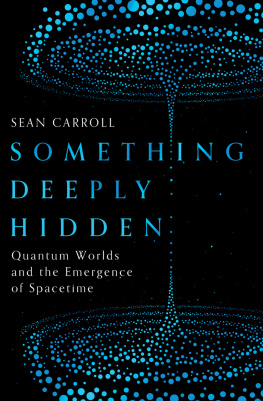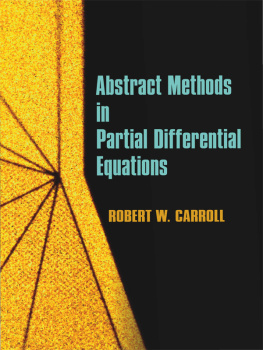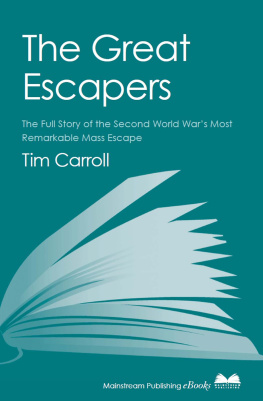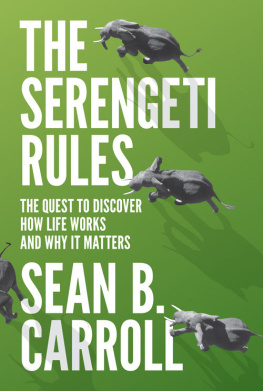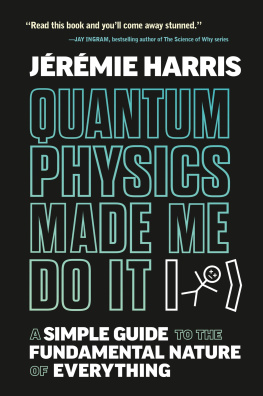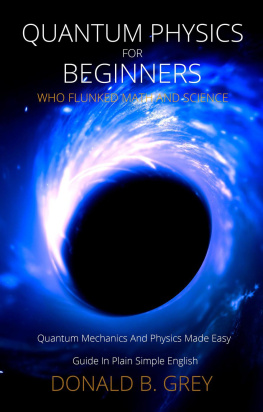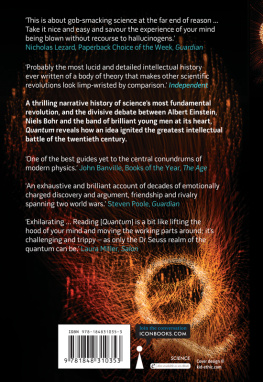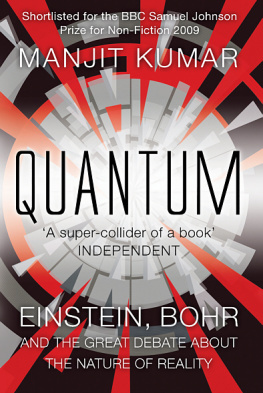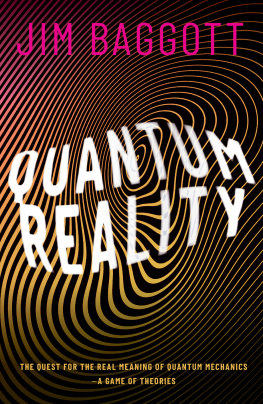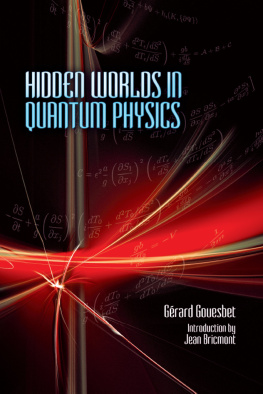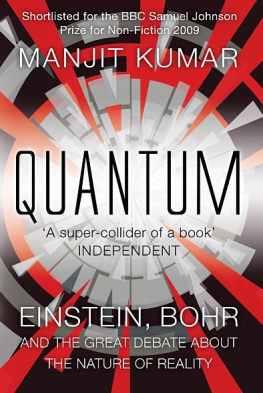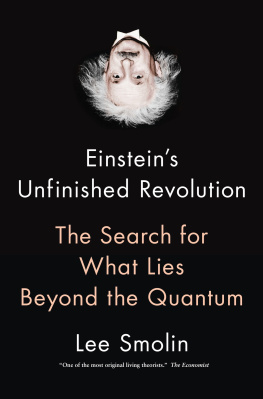MORE PRAISE FOR SOMETHING DEEPLY HIDDEN
Sean Carroll is always lucid and funny, gratifyingly readable, while still excavating depths. He advocates an acceptance of quantum mechanics at its most minimal, its most austereappealing to the allure of the pristine. The consequence is an annihilation of our conventional notions of reality in favor of an utterly surreal world of Many-Worlds. Sean includes us in the battle between a simple reality versus a multitude of realities that feels barely on the periphery of human comprehension. He includes us in the ideas, the philosophy, and the foment of revolution. A fascinating and important book.
Janna Levin, professor of physics and astronomy at Barnard College and author of Black Hole Blues
Sean Carroll beautifully clarifies the debate about the foundations of quantum mechanics and champions the most elegant, courageous approach: the astonishing Many-Worlds interpretation. His explanations of its pros and cons are clear, evenhanded, and philosophically gob-smacking.
Steven Strogatz, professor of mathematics at Cornell University and author of Infinite Powers
Carroll gives us a front-row seat to the development of a new vision of physics: one that connects our everyday experiences to a dizzying hall-of-mirrors universe in which our very sense of self is challenged. Its a fascinating idea and one that just might hold clues to a deeper reality.
Katie Mack, theoretical astrophysicist at North Carolina State University and author of the forthcoming The End of Everything
I was overwhelmed by tears of joy at seeing so many fundamental issues explained as well as they ever have been. Something Deeply Hidden is a masterpiece, which stands along with Feynmans QED as one of the two best popularizations of quantum mechanics Ive ever seen. And if we classify QED as having had different goals, then its just the best popularization of quantum mechanics Ive ever seen, full stop.
Scott Aaronson, professor of computer science at the University of Texas at Austin and director of UTs Quantum Information Center
Irresistible and an absolute treat to read. While this is a book about some of the deepest current mysteries in physics, it is also a book about metaphysics, as Carroll lucidly guides us on how to not only think about the true and hidden nature of reality but also how to make sense of it. I loved this book.
Priyamvada Natarajan, theoretical astrophysicist at Yale University and author of Mapping the Heavens
SOMETHING DEEPLY HIDDEN
ALSO BY SEAN CARROLL
From Eternity to Here
The Particle at the End of the Universe
The Big Picture

SOMETHING DEEPLY HIDDEN
Quantum Worlds and the Emergence of Spacetime
SEAN CARROLL

To thinkers throughout history
who stuck to their guns
for the right reasons
CONTENTS
SOMETHING DEEPLY HIDDEN
PROLOGUE
Dont Be Afraid
You dont need a PhD in theoretical physics to be afraid of quantum mechanics. But it doesnt hurt.
That might seem strange. Quantum mechanics is our best theory of the microscopic world. It describes how atoms and particles interact through the forces of nature, and makes incredibly precise experimental predictions. To be sure, quantum mechanics has something of a reputation for being difficult, mysterious, just this side of magic. But professional physicists, of all people, should be relatively comfortable with a theory like that. They are constantly doing intricate calculations involving quantum phenomena, and building giant machines dedicated to testing the resulting predictions. Surely were not suggesting that physicists have been faking it all this time?
They havent been faking, but they havent exactly been honest with themselves either. On the one hand, quantum mechanics is the heart and soul of modern physics. Astrophysicists, particle physicists, atomic physicists, laser physicistseveryone uses quantum mechanics all the time, and theyre very good at it. Its not just a matter of esoteric research. Quantum mechanics is ubiquitous in modern technology. Semiconductors, transistors, microchips, lasers, and computer memory all rely on quantum mechanics to function. For that matter, quantum mechanics is necessary to make sense of the most basic features of the world around us. Essentially all of chemistry is a matter of applied quantum mechanics. To understand how the sun shines, or why tables are solid, you need quantum mechanics.
Imagine closing your eyes. Hopefully things look pretty dark. You might think that makes sense, because no light is coming in. But thats not quite right; infrared light, with a slightly longer wavelength than visible light, is being emitted all the time by any warm object, and that includes your own body. If our eyes were as sensitive to infrared light as they are to visible light, we would be blinded even when our lids were closed, from all the light emitted by our eyeballs themselves. But the rods and cones that act as light receptors in our eyes are cleverly sensitive to visible light, not infrared. How do they manage that? Ultimately, the answer comes down to quantum mechanics.
Quantum mechanics isnt magic. It is the deepest, most comprehensive view of reality we have. As far as we currently know, quantum mechanics isnt just an approximation of the truth; it is the truth. Thats subject to change in the face of unexpected experimental results, but weve seen no hints of any such surprises thus far. The development of quantum mechanics in the early years of the twentieth century, involving names like Planck, Einstein, Bohr, Heisenberg, Schrdinger, and Dirac, left us by 1927 with a mature understanding that is surely one of the greatest intellectual accomplishments in human history. We have every reason to be proud.
On the other hand, in the memorable words of Richard Feynman, precise predictions that have been triumphantly vindicated by the data. But if you want to dig deeper and ask what is really going on, we simply dont know. Physicists tend to treat quantum mechanics like a mindless robot they rely on to perform certain tasks, not as a beloved friend they care about on a personal level.
This attitude among the professionals seeps into how quantum mechanics gets explained to the wider world. What we would like to do is to present a fully formed picture of Nature, but we cant quite do that, since physicists dont agree about what quantum mechanics actually says. Instead, popular treatments tend to emphasize that quantum mechanics is mysterious, baffling, impossible to understand. That message goes against the basic principles that science stands for, which include the idea that the world is fundamentally intelligible. We have something of a mental block when it comes to quantum mechanics, and we need a bit of quantum therapy to help get past it.

When we teach quantum mechanics to students, they are taught a list of rules. Some of the rules are of a familiar type: theres a mathematical description of quantum systems, plus an explanation of how such systems evolve over time. But then there are a bunch of extra rules that have no analogue in any other theory of physics. These extra rules tell us what happens when we
Next page
